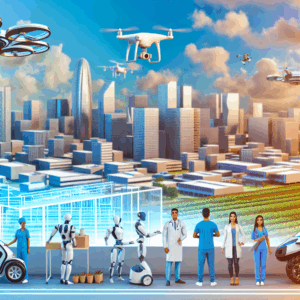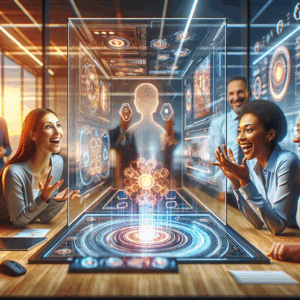AI’s Impact on Human Relationships as Mark Zuckerberg Explores AI Companionship
Introduction
Artificial Intelligence (AI) has steadily woven itself into the fabric of everyday life, revolutionizing how we interact with technology and each other. From virtual assistants like Siri and Alexa to advanced machine learning algorithms, AI technologies have transformed personal and professional spheres alike. At the forefront of these developments is Mark Zuckerberg, the CEO of Meta Platforms, who advocates for AI’s potential in developing deeper human-like companionships capable of addressing societal challenges, such as loneliness.
This blog delves into AI’s burgeoning effect on human relationships and Zuckerberg’s specific interest in AI companionship. We will explore how these technologies are transforming our interactions, highlight ethical implications, and speculate on future advancements.
Historical Context
The journey of AI in reshaping human interactions began with its early applications in communication during the mid-20th century. Initial uses included simple, rule-based chat systems, which evolved into sophisticated virtual assistants that can understand and process natural language. These virtual entities have progressively become more ingrained in our daily routines, helping manage tasks and offering conversational engagement.
Significant milestones in AI companionship have marked this evolution. Eliza, created in the 1960s, was one of the first chatbots and a rudimentary precursor to today’s AI companions. Technologies have since advanced exponentially, leading to modern iterations capable of simulating human-like interactions with increased emotional intelligence.
Current Developments in AI Companionship
At Meta Platforms, Mark Zuckerberg is fueling the exploration of AI companionship technologies. These initiatives include developing chatbots and virtual avatars aiming to emulate friendship and companionship for users. AI companions like Replika and other chatbot applications already provide emotionally satisfying conversations for their users by simulating empathy, understanding, and support.
People today use AI companions in various capacities, from simple entertainment to emotional support during isolated times. Extensive interactions are reported across user demographics, with many finding comfort in AI companionships fostered by engaging dialog and 24/7 availability.
Ethical Considerations
The deployment of AI companionship technologies comes with notable ethical concerns. Importantly, while AI companions can provide temporary emotional relief, they cannot replicate the full depth of human emotional connections. Experts caution that over-reliance on AI for emotional fulfillment might exacerbate mental health issues, intensifying loneliness due to the lack of genuine social interaction.
Another pressing issue is privacy. The data collected by AI systems could be susceptible to misuse, raising concerns about transparency and user consent. Maintaining ethical boundaries between human and AI relationships is pivotal, ensuring these technologies enhance rather than replace human connections.
Potential Future Impacts
Looking towards the future, AI companions may continue to advance, potentially changing the landscape of human relationships over the next decade. As technology progresses, AI may become more adept in detecting emotional cues, potentially offering more nuanced support and fostering new types of social relationships beyond conventional norms.
AI’s role in combating loneliness is significant. With societies grappling with social isolation, particularly in younger age groups, AI companions may gain an increasing presence in lives worldwide. They could act as a bridge, offering initial emotional connectivity that might lead people back to forming deeper human relationships.
Speculations suggest potential societal transformations regarding relationship building. AI companions might become integrated into daily rituals, establishing new norms surrounding friendship, support, and community interaction.
Technical Aspects: Coding and AI Companionship
Developing AI companions involves sophisticated software frameworks, with TensorFlow and PyTorch being popular choices due to their robustness and versatility in handling deep learning tasks. These frameworks enable the creation of chatbots capable of carrying meaningful conversations and adapting to user inputs.
Though no code is provided here, a rudimentary function of a chatbot can be imagined whereby it processes natural language input from users and generates responses through pre-trained language models. Machine learning models suited for companionship applications must prioritize conversational fluidity, emotional intelligence, and language nuances.
Conclusion
Throughout this exploration, we’ve witnessed how AI is poised to redefine human relationships, seen through Mark Zuckerberg’s proactive pursuit of AI companionship technologies. While AI companions present numerous opportunities for enhancing human interaction, especially during isolation, they must be balanced with authentic human connections to prevent potential psychosocial drawbacks.
As developers and tech enthusiasts, engaging with AI responsibly is essential to ensuring beneficial integration into society. By fostering a conscious approach, we can harness AI to complement and enrich human experiences. We encourage you to share your insights and thoughts on the evolving interplay between AI and human relationships.





